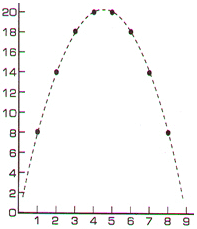Expertise and the Inverted Parabola
Published on Jul 18, 2008 (updated Nov 19, 2022), filed under misc (feed). (Share this on Mastodon or Bluesky?)
I’m not a mathematician!—but it looks like applying one’s experience and expertise results in an inverted parabola when it comes to the amount of work invested. That is, knowledge or its use, respectively, seem to mean that beginners don’t know what to do and thus don’t do much, while experts do less as they know what to leave out.
This is not a new case of “less is more” but rather something I feel reminded of when, for example, observing HTML markup in the wild. HTML novices create documents or sites using the 10 elements they know; after some time they use 25; at the zenith, having gained considerable experience, they go for all 77 elements of XHTML; at some point they discover that this might be excessive and make things simpler, likely for the sake of maintainability; one day, they get up and throw everything out that isn’t needed, at all.
In other cases, designers decorate the hell on everything they find without adding value, rather distracting from what’s important, right after they struggled to get anything done at all and before eventually discovering that form should follow function and that design is not art is not decoration.
Same for the first website: Getting it out is the first objective, squashing everything in that is within reach is next, normalizing the site might mean the next iteration, almost taking it off in order to focus on the relevant stuff eventually concludes the learning process.
The accessibility élèves know the same deal: Add the first alt text, add input placeholder text, add “skip” links, add this, add that, then do the first test and remove some things again, as some techniques impose more problems than they solve, or aren’t our problem at all.
This may all makes sense, but I find it interesting regardless. There is no shortcut to gain expertise, and the beginner’s “not doing much” does not equal the expert’s “not doing much.” However, I wonder if beginners aren’t sometimes better off than the intermediates. After all, not knowing about something or not doing anything at all must not be a bad thing…
About Me
I’m Jens (long: Jens Oliver Meiert), and I’m a web developer, manager, and author. I’ve been working as a technical lead and engineering manager for companies you’ve never heard of and companies you use every day, I’m an occasional contributor to web standards (like HTML, CSS, WCAG), and I write and review books for O’Reilly and Frontend Dogma.
I love trying things, not only in web development and engineering management, but also in other areas like philosophy. Here on meiert.com I share some of my experiences and views. (I value you being critical, interpreting charitably, and giving feedback.)

